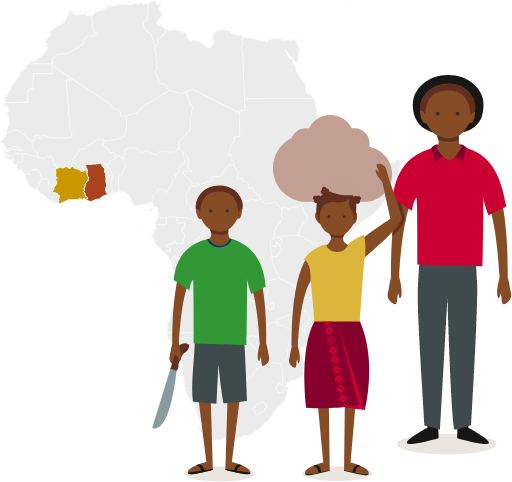Forced labour affects less than 1% of children working in cocoa-growing regions in Côte d'Ivoire and Ghana.
Studies suggest that forced labour risks are present in the cocoa sector affecting both adults and children, but it is much less common than child labour. However, its impact on those involved can be more serious.

Forced labour is far less prevalent than child labour in the cocoa supply chain, though its impacts can be more serious. According to estimates by the Walk Free Foundation, forced labour affects less than 1% of children working in cocoa-growing areas in Cote d’Ivoire and Ghana, and less than 0.4% of adults working in cocoa in these countries
As part of our mission to tackle human rights issues in the cocoa supply chain, we work with our members and partners to identify, address, and prevent the risk of forced labour.
What is forced labour?
Forced labour is defined by the International Labour Organization as "all work or service which is exacted from any person under the threat of a penalty and for which the person has not offered himself or herself voluntarily." Cases can often involve deception and manipulation, such as workers doing work they did not originally agree to or having their identity papers taken from them, in addition to physical violence or its threat.
For children, forced labour is defined as being forced to work because of a penalty or threat of one from someone other than their parents, although the threat can be to the child themselves or a family member such as a parent. Children can also find themselves in a position of forced labour if their parents are in forced labour.
What are the risk factors?
Several factors can increase the risk of forced labour:
- Illiteracy, linked to a lack of access to quality education, means workers often struggle to understand their rights or employment contracts.
- Traditional patterns of migration often uproot workers from the societies that protect them.
- Poverty, combined with a lack of income diversity, often render workers more vulnerable to predatory or abusive working relationships.
- In the cocoa sector a lack of formal contracts for farmers and farm workers, as well as low awareness of labour laws and a weak capacity to enforce them in remote rural areas, further increase the risk of forced labour and allow potentially abusive working relationships to go unchecked.
